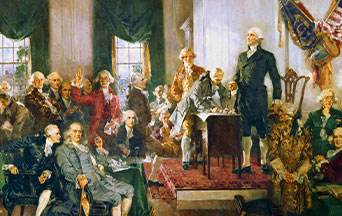
As nationalism and populist political philosophies gain traction, many Americans are adopting isolationist and noninterventionist positions. An America-first approach calls for focusing on national problems. The isolationist argument is that the burden of international commitments has weighed heavily upon the nation for too long. Let others deal with these problems and intervene.
A Return to the Founders
One argument given to support this position is to cite the American Founders. Indeed, many claim they were the first isolationists. George Washington insisted that America not get involved in Founders entanglements. Thus, a return to the Founders would set things right.
Why America Must Reject Isolationism and Its Dangers
However, a careful reading of the history of the young American Republic tells a different story. While some Founders certainly had isolationist tendencies, others soon learned the hard lessons of not being prepared to defend American interests abroad.
A world full of dangers awakened early American administrations to see that there is no substitute for a strong defense, active diplomacy and willingness to intervene to secure the peace.
The Myth of American Isolationism
The masterly 2013 study, “The Myth of American Isolationism: Commerce, Diplomacy, and Military Affairs in the Early Republic,” shows beyond a doubt that the Founders developed a foreign policy that struck a balance between the idealism of American principles and the realism of situations that demanded action and intervention.
Author Marion Smith demonstrates how the Founders safeguarded the nation’s independence with a policy full of practical wisdom and strength. The Heritage Foundation scholar tracks the course of this policy over the seventy years from independence to the Civil War.
The Founders Favored Necessary Engagement
The myth of early American isolationism is often based on a passage from President Washington’s Farewell Address, in which he warned against “the insidious wiles of foreign influence.”
However, his speech also sought to implement moderate policies “to gain time for our country to settle and mature its recent institutions, and to progress, without interruption, to that degree of strength and consistency which is necessary to give it, humanly speaking, command of its own fortunes.”
President Washington did not condemn all foreign involvement but sought to avoid unnecessary complications from foreign ties. He asked for time to develop wise policies for a country with little experience navigating such treacherous waters.
An Appeal to Diplomacy
From her very beginnings, America actively reached out to the community of nations with which she traded and interacted. Her vibrant trade connections spanned the globe and thus required a diplomatic position, not of isolation but affirmation.
 Learn All About the Prophecies of Our Lady of Good Success About Our Times
Learn All About the Prophecies of Our Lady of Good Success About Our Times
After independence, America quickly expanded its diplomatic corps from twenty officers in 1790 to 282 in 1860. America opened embassies and consulates everywhere to negotiate treaties and facilitate trade. The United States also cooperated with a host of international partners to promote other interests outside trade, including stopping the slave trade. This intense diplomatic activity contradicts the idea of America as a nation of isolation.
One example of early American diplomatic prowess was the 1823 Monroe Doctrine, which displayed a determination to close off the New World to new colonization. It was a bold declaration that impacted the world and strengthened U.S. sovereignty. It could not be more contrary to an isolationist vision that does not get involved with international politics or promote policies that determine the future of other nations.
Peace Through Strength
In addition to diplomacy, America also engaged in military action to defend American trade, citizens and interests abroad. The American Navy was especially active in protecting this commerce. She defied the corsairs of Tripoli and would not hesitate to engage enemies, a policy that gained the respect of the nations.
Marion Smith claims the Founders “approached foreign policy with a realistic assessment of human nature and the nature of international relations.” They concluded that without adequate military strength, America would not maintain the independence needed to control its own foreign policy.
When Congress refused to support a strong defense force, America soon learned the hard lesson of those who prefer concession to victory. The author notes, “brief flirtations with noninterventionism in practice led to ruinous results.”
10 Razones Por las Cuales el “Matrimonio” Homosexual es Dañino y tiene que Ser Desaprobado
The Founders reached a consensus about the need for a policy of peace through strength after the War of 1812. America was unprepared for the war and realized that relying solely on diplomacy would not work to secure the peace. The Founders saw necessary intervention as an extension of the constitutional duty to provide for the common defense.
A Policy of Intervention, Not Isolation
Thus, the seventy years after independence were a time of intervention, not isolation. The author records some 58 military interventions, ranging from major wars to significant clashes and minor incidents.
Many conflicts involved the defense of commercial interests. However, America would also help restore order in nations suffering from chaos and revolution.
There were dozens of brief hostilities that went beyond defensive acts and involved retaliatory or preemptive attacks as a means to stop further aggression. Landings protected American citizens and property during times of insurrection or piracy. Foreign countries that attacked American trade could expect retribution. In 1815, Algiers demanded tribute to buy peace and received a naval attack instead.
Thus, intervention was practiced not only in cases where American territorial integrity was in danger but also to forestall attacks on American interests or citizens abroad.
Such actions instilled respect in others, enhancing American statecraft and making her foreign interests more secure.
Science Confirms: Angels Took the House of Our Lady of Nazareth to Loreto
“America’s constitutional principles do not demand isolationism,” Marion Smith concludes, “and the Founders did not practice a noninterventionist foreign policy.”
America should not make the mistake of implementing such policies today.

